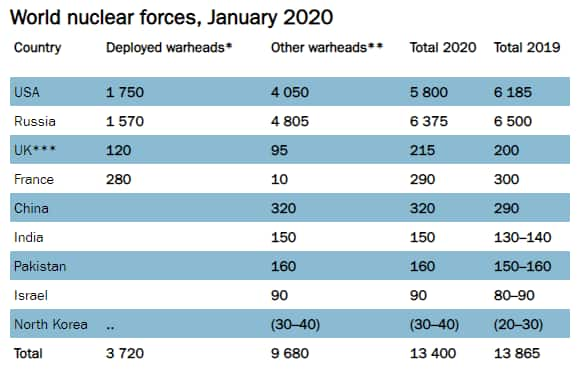China-Pakistan's rising nuclear arsenal poses threat to India, world
The Stockholm International Peace Research Institute on Monday launched the findings of SIPRI Yearbook 2020 and informed that Pakistan currently has 160 nuclear weapons, while China is in possession of 320 nukes.
New Delhi: The emergence of China is giving sleepless nights to those nations which talk about global peace and brotherhood. The Asian superpower, which, of late, became the center of coronavirus that claimed the lives of millions across the world, is helping Pakistan, infamous for being the center of terror groups, to consolidate its nuclear arsenal. Together, both the nations have covered a long distance in the nuclear arms race, posing a threat to the global community with their nukes.
An international body tracking nuclear weapons has come out with startling revelations in its latest report on the current state of armaments, disarmament and international security. The Stockholm International Peace Research Institute (SIPRI) on Monday (June 15) launched the findings of SIPRI Yearbook 2020 and informed that Pakistan currently has 160 nuclear weapons, while China is in possession of 320 nukes.
China has built 30 new nuclear weapons in the last one year as in the year 2019, it had 290 nuclear weapons, while India is said to have a total of 150 nuclear weapons. The report, however, does not mention whether India's nuclear weapons have increased or decreased.
"China is in the middle of a significant modernisation of its nuclear arsenal. It is developing a so-called nuclear triad for the first time, made up of new land- and sea-based missiles and nuclear-capable aircraft," the report warned.
It further said, "India and Pakistan are slowly increasing the size and diversity of their nuclear forces, while North Korea continues to prioritise its military nuclear programme as a central element of its national security strategy."
The SIPRI Yearbook said that despite an overall decrease in the number of nuclear warheads, nuclear powers continue to modernise their arsenals, warning that tensions were rising and the outlook for arms control was "bleak".
"The nine nuclear-armed states—the United States, Russia, the United Kingdom, France, China, India, Pakistan, Israel and the Democratic People’s Republic of Korea (North Korea)— together possessed an estimated 13400 nuclear weapons at the start of 2020. This marked a decrease from the 13865 nuclear weapons that the report estimated these states possessed at the beginning of 2019."
"Around 3720 of the nuclear weapons are currently deployed with operational forces and nearly 1800 of these are kept in a state of high operational alert," it said.
"The decrease in the overall number of nuclear weapons in the world in 2019 was largely due to the dismantlement of retired nuclear weapons by Russia and the USA—which together still possess over 90 per cent of global nuclear weapons. The reductions in US and Russian strategic nuclear forces required by the 2010 Treaty on Measures for the Further Reduction and Limitation of Strategic Offensive Arms (New START) were completed in 2018, and in 2019 the forces of both countries remained below the limits specified by the treaty," the report said.
According to the report, the New START will lapse in February 2021, unless both parties agree to prolong it. "However, discussions to extend New START or to negotiate a new treaty made no progress in 2019. This was due in part to the US administration’s insistence that China must join any future nuclear arms reduction talks—something that China has categorically ruled out," it said.
The SIPRI report also said that the availability of reliable information on the status of the nuclear arsenals and capabilities of the nuclear-armed states varies considerably.
"The USA has disclosed important information about its stockpile and nuclear capabilities but in 2019 the US administration ended the practice of publicly disclosing the size of the US stockpile," says Hans M Kristensen, Associate Senior Fellow with SIPRI’s Nuclear Disarmament, Arms Control, and Non-proliferation Programme and Director of the Nuclear Information Project at the Federation of American Scientists (FAS).
"The UK and France have also declared some information. Russia does not make publicly available a detailed breakdown of its forces counted under New START, even though it shares this information with the USA," it said.
"The governments of India and Pakistan make statements about some of their missile tests but provide little information about the status or size of their arsenals," it added.
"In these times of ever-increasing geopolitical tensions, the absence of adequate measures to monitor nuclear arsenals and to prevent the proliferation of nuclear weapons and materials is a particularly worrying development," Shannon Kile, Director of SIPRI's Nuclear Disarmament, Arms Control and Non-proliferation Programme, said.
Stay informed on all the latest news, real-time breaking news updates, and follow all the important headlines in india news and world News on Zee News.

